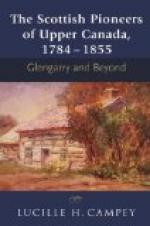“The Indians universally fix upon a particular object, as sacred to themselves; as the giver of their prosperity, and as their preserver from evil. The choice is determined either by a dream, or by some strong predilection of fancy; and usually falls upon an animal, or part of an animal, or something else which is to be met with, by land, or by water; but ‘Great Road’ had made choice of his hair—placing, like Samson, all his safety in this portion of his proper substance! His hair was the fountain of all his happiness; it was his strength and his weapon, his spear and his shield. It preserved him in battle, directed him in the chase, watched over him on the march, and gave length of days to his wife and children. Hair, of a quality like this, was not to be profaned by the touch of human hands. I was assured that it had never been cut nor combed from his childhood upward, and, that when any part of it fell from his head, he treasured up that part with care: meanwhile, it did not escape all care, even while growing on the head; but was in the special charge of a spirit, who dressed it while the owner slept. All this might be; but the spirit’s style of hairdressing was at least peculiar; the hair being suffered to remain very much as if it received no dressing at all, and matted into ropes, which spread themselves in all directions.”
From this Assiniboin village Henry saw, for the first time, one of those herds of horses which the Assiniboins possessed in numbers. The herd was feeding on the skirts of the plain. The horses were provided with no fodder, but were left to find food for themselves, which they did in winter by removing the snow with their feet till they reach the grass. This was everywhere on the ground in plenty.
Amongst these people they saw the paunch or stomach of a bison employed as a kettle. This was hung in the smoke of a fire and filled with snow. As the snow melted, more was added, till the paunch was full of water. The lower orifice of the organ was used for drawing off the water, and stopped with a plug and string.
Henry also noticed amongst the Assiniboins the celebrated lariat. This is formed of a stone of about two pounds weight, which is sewed up in leather and made fast to a wooden handle two feet long. In using it the stone is whirled round the handle by a warrior sitting on horseback and riding at full speed. Every stroke which takes effect brings down a man, a horse, or a bison. To prevent the weapon from slipping out of the hand, a string, which is tied to the handle, is also passed round the wrist of the wearer.




